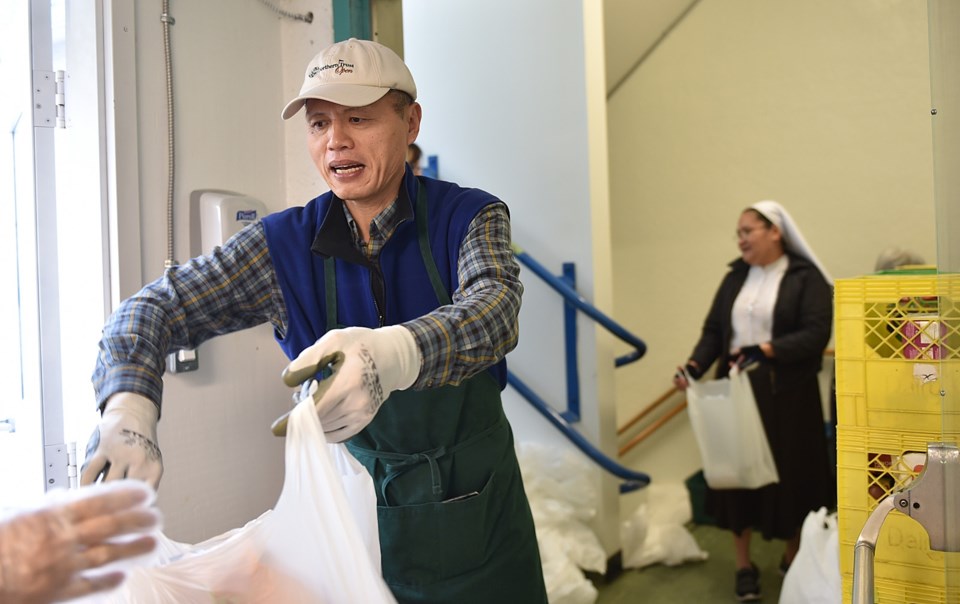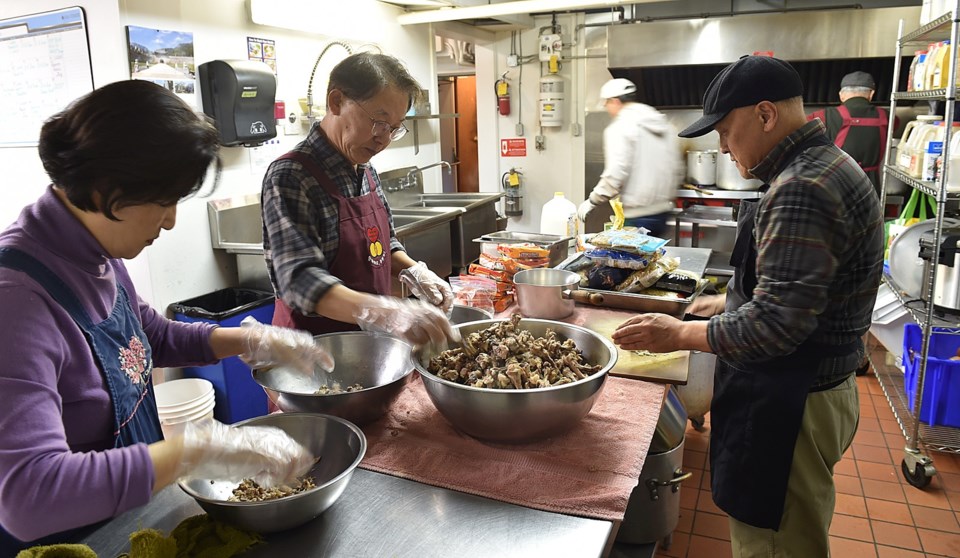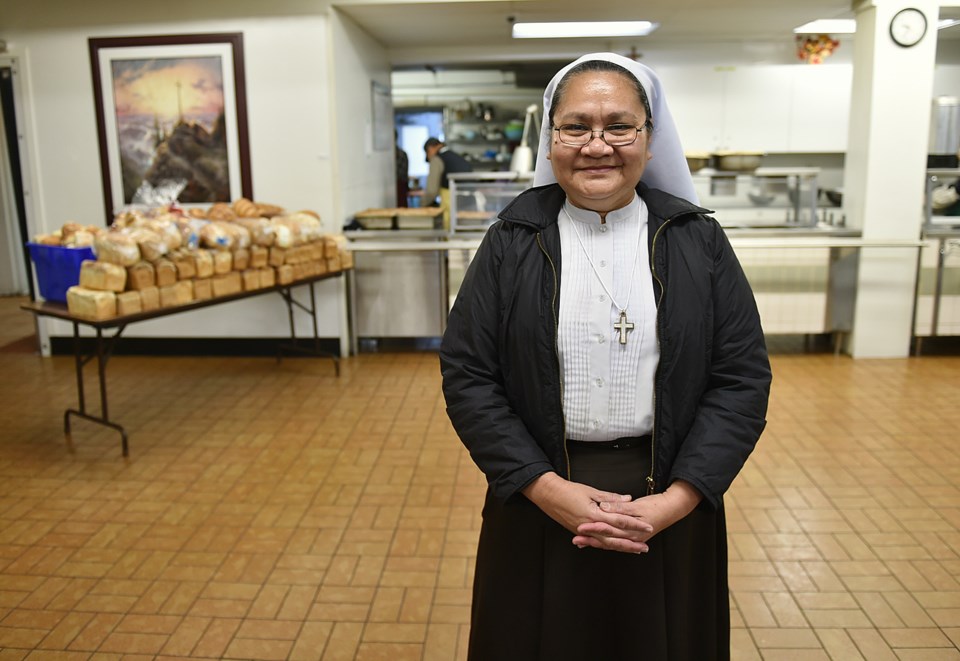Welcome to Leap of Faith, a weekly blog hosted by veteran religion reporter Alicia Ambrosio, exploring faith, spirituality and Vancouver's sacred spaces.
Sister Chita Torres is just about five feet tall and not exactly an imposing figure, but there is purpose in her steps and a spark in her eyes as she receives and hands off plastic bags down an assembly line after adding a can of soup to each bag.
“We will pack 180 bags today,” she says, keeping one eye on me and one eye on her bags. “But probably 200 people will turn up.”
Torres is the co-director of , a drop-in centre for people living on the streets – or struggling to make ends meet – that’s funded by and supported by local Catholic churches.
Originally located at 373 Cordova St., the centre moved to its current site at 255 Dunlevy Ave. about four years ago, taking over the site where the Franciscan Sisters of the Atonement used to run a soup kitchen. Due to advancing age and a lack of new sisters, the Sisters of the Atonement had to close their ministry in Vancouver.
On this Thursday morning, Torres is helping pack food delivered by the Greater Â鶹´«Ă˝Ół»Food Bank into bags that clients will pick up from a side window. Meanwhile, a crew of five volunteers down in the kitchen chatters away and chops vegetables for lunch.

Lunch is served at the centre every day at 11 a.m. Wednesday is “Ladies Day,” when breakfast is served at 8:30 a.m. in addition to lunch. Some of the women stay to take part in an arts and crafts program, talk to a social worker or counsellor, or just spend the day in a warm, safe place chatting with other ladies.
In the dining room, which can hold about 100 people, a simple but healthy lunch is served: tuna salad sandwiches and vegetable soup. Once food bank distribution is over, volunteers will serve coffee and dessert from the same window.
Food is not the only thing on offer at the centre. Torres takes me upstairs to the clothes bank, where volunteers sort and distribute donated clothing to clients as needed.
“We need underwear, men’s and ladies’, and socks,” Torres says.
Though The Door is Open is small compared to other outreach centres in the area and cannot offer shelter services, there are regulars who consider the centre “theirs.”
Scott Small, the director of Catholic Charities, tells me on the phone that “it’s the Cheers factor. [Clients] seek out places where they are known.”
Some regulars have told Torres they come back because “it’s not about the food, it’s about the way we treat them.”

When doors open for lunch, Torres and the volunteers lead a short song that serves as a prayer before meals – the only overtly religious element to the centre’s services. One volunteer is sent out to greet the people waiting in line and find out if anyone needs anything from the clothes bank. In the dining room, Torres and two fellow sisters walk among the people, chatting and greeting diners.
“We don’t judge,” she says, “and they are honest with us. Some will tell us if they are on drugs, if they are high or whatever.”
Over time, relationships are established between those who use the centre and its staff, which can have a profound impact on the former.
“We have one [longtime] regular, Jack, who was sleeping in Stanley Park. He came to volunteer. He was homeless but he volunteered. Last month he told me all about his life. After that I suggested to him to talk to the social worker. He did.
“Now, one month later, he is in a house, but he is still in line here because the money he gets is only enough for rent,” Torres says.
Guests like Jack can speak to counsellors and a social worker at the centre, or get help accessing housing with case workers from the on Cambie and Robson, which is also run by Catholic Charities.
For Torres, Small and the team of volunteers at the centre, providing meals and a warm place to hang out is not just a nice thing to do, it is a visible expression of the faith they profess.
Catholic teaching pulls no punches when it comes to social justice (to the chagrin of some). The Catechism of the Catholic Church – a book that contains official church teaching on most matters under the sun – says, “God blesses those who come to the aid of the poor and rebukes those who turn away from them” and backs it up with biblical references for good measure.Â
Christians of all denominations share this view and make it visible in myriad ways across the city.
Both ˛ą˛Ô»ĺĚý cite their belief in Jesus as the motivation behind their missions. Across the city, churches big and small offer a variety of services aimed at creating community, showing care for those in need and offering some measure of practical help.
Christ Church Cathedral operates five days a week, alternating between serving lunch and dinner. The cafe is open to everyone in the neighbourhood: seniors, tourists and homeless. Similarly, Church in Kerrisdale hosts a community lunch every Tuesday. A mobile care unit with community health workers is on hand every two weeks to meet with participants.
in East Â鶹´«Ă˝Ół»offers a hot meal, spiritual nourishment, and help accessing housing services every Sunday through a program called Club Freedom.The church also makes low-cost vegetables available to any family in the neighbourhood through a bulk-buying program.
The moral imperative to help the poor is certainly not limited to Christians. Sikh Gurdwaras are required to serve a free, community meal open to all. The practice, known as “langar,” was established by Guru Nanak in the 15th century in an attempt to overcome caste distinction. The on Skeena Street serves a free community meal Monday to Thursday at 6 p.m. About 100 to 150 people come in for the hot, vegetarian meal every night.
Helping the less fortunate doesn’t always involve those living on the streets. , a Jewish Renewal synagogue on 10th Avenue and Fraser Street, decided to sponsor Syrian refugees. Rabbi Hannah Dresner told me the congregation of almost 300 families sponsored four Syrian families, comprising 14 people.
“We raised more money for that than we do during our own annual campaign,” Dresner said.
Each Syrian family has a team of Or Shalom congregants who support them and help them settle into life in Vancouver.
“Its our way of sharing our light with other people,” said Dresner.
• After graduating from Simon Fraser University with a degree in communication, Alicia moved to Rome, where she got an unexpected start covering religion. Stints in Toronto, Madrid and Toronto followed, culminating with her return home to the West Coast. Alicia has worked as a television producer and host, and is currently a freelance writer for Aleteia and Catholic News Service, as well as Leap of Faith, the Westender's blog on faith and spirituality in Vancouver.



